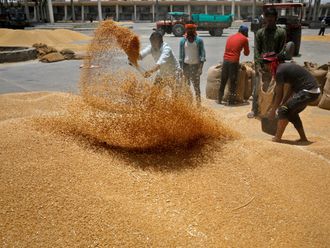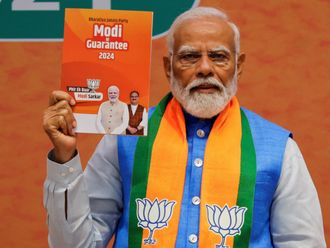Does it have to be a woman to give credit to what other women have achieved in their field?
For the first time, women's contribution through the centuries to South Indian classical music will be acknowledged and honoured at a presentation on the eve of International Women's Day.
"It is intriguing to note that most of the composers dealt with and heard are men," says Vasumathi Badrinathan, a Carnatic music vocalist, "which makes us believe that women have hardly made their presence felt in this domain."
"However, it is interesting to note that they have very much been part of the music making tradition", she told Gulf News in an interview at her Chembur home yesterday.
Badrinathan, who is herself a creative and accomplished artiste of South Indian classical music and dance, got drawn into this unexplored subject and for the last one year has been scouring rare books and contacting scholars to learn more about these women who have not been given their due place in the firmament of Indian music.
Stocked with valuable information, she has found the appropriate moment, on the eve of International Women's Day, to present the works of five or six composers spanning six centuries from the 12th century until today at Stree Gaanam, an event supported by the Department of Culture, Government of India.
These women, from Andhra Pradesh, Karnataka, Kerala and Tamil Nadu had produced an amazing collection of compositions and yet none of the works came to the forefront, she says.
There is no authentic information to tell us whether the women also sang their own compositions of musical poetry since "women never emerged outside their homes in the past".
For example, not many are aware that Princess Rukmini Bai Thamburatti, sister of the famous composer Maharaja Swathi Thirunal of Kerala, was herself a scholarly person whose compositions were popular in the temple circuit.
"Coming from the royal family of Travancore, she would certainly have had a good knowledge of music to compose music."
Andal, who lived around the seventh century, is the only woman to hold an elevated status of being counted among the 12 Alwars‚ (poet-saint-philosopher) revered in South India.
Andal composed several hymns in praise of the Hindu deity Krishna in her two celebrated works Tiruppavai and Nachiyar Tirumozhi, the former being sung every month in Tamil Nadu and the latter remains an eternal testimony of love songs of all times.
Unacknowledged for long was Akka Mahadevi from Karnataka who was married to a king but renounced all worldly pleasures to sing devotional songs called Bachanas‚ or free verse lyrics, in Kannada.
"About 350 poems are attributed to her," says Badrinathan.
"It is intriguing to note that most of the composers dealt with and heard are men which makes us believe that women have hardly made their presence felt in this domain."












